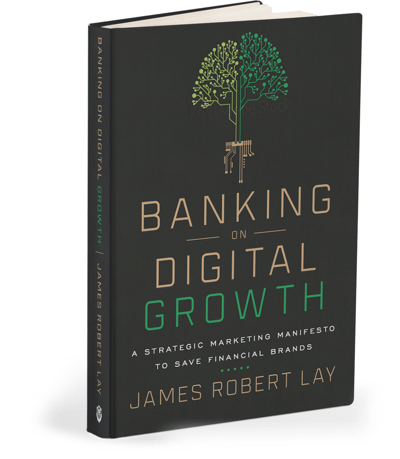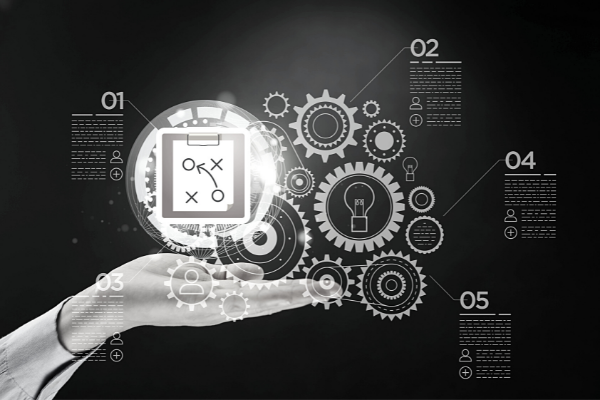“... It's about the humans that are at the workplace, they're at the center of your business. And making sure that all of your business strategy and everything you do you take that into consideration from a people-first approach. And that's like the simplest way to defining love as a business strategy.” --Mohammad Anwar
Perhaps you’ve heard phrases like, “Real leaders serve” or seen articles about the art of servant leadership. Ultimately, this business approach comes down to love, and the power it has to unite a team and help everyone put their best foot forward.
Mohammad Anwar, the CEO of Softway, a global business-to-employee solutions company with a team of over 200 people based in both Houston, Texas and Bangalore, India, joined James Robert on the Banking on Digital Growth Podcast.
He believes that love is a critical business strategy, and he’s published a book and started a podcast surrounding this very idea.
Love as a Business Strategy
Mohammad’s new book, Love as a Business Strategy may seem familiar at first to anyone who has read The Five Love Languages. Mohammad begins his book with a discussion about the love languages of business.
The concept of love has many different connotations. But what does it mean to love in the workplace?
Mohammad explains, “The best way we describe it is, it's about the humans that are at the workplace. They're the center of your business and making sure that all of your business strategy and everything you do, you take that into consideration from a people-first approach. And that's like the simplest way to defining love as a business strategy.”
Essentially, love as a business strategy means caring for people, having empathy for the people within one’s organization, and prioritizing them over profits or shareholders.
Mohammad proposed that, “Ultimately, by doing that, it's not that you're giving up on your profitability or your shareholders’ priorities, but in fact, by prioritizing your people, you're able to still achieve your business outcomes.”
In short, banks and credit unions who have not already done so must ask themselves when they will stop viewing employees as a cost and instead as an investment in their future growth.
They must also consider the massive transformations in banking and technology that were driven by the COVID-19 pandemic. Moving forward, employee experience, or EX, will separate the organizations, including banks, that will survive the pandemic.
Many businesses have rationalized profits over people as the proper priority. But as a result, banking has become impersonal. This becomes a self-fulfilling cycle. Banking becomes impersonal, profits decrease, banks look for ways to cut costs, and their solutions are layoffs, furloughs, and other staffing-related solutions.
A financial brand must transform its entire mindset. They can’t just be people-first, but also employee-first. There’s been a great deal of conversation over the past few years about customer experience, but that leaves out employees.
In today's day and age, banks have run into the need for agility, adoption, and empathy, especially towards their employees. What the COVID-19 pandemic did for banks is eliminate the traditional way of working, demonstrating more and more that these banks must have trust in their people. Working in a digital format, there’s no other choice.
Mohammad shared, “You really need the people to be motivated and inspired and empowered to get work done and achieve your business outcomes. And especially in an environment where there's so much uncertainty and change, it's very difficult to maintain that top-down structure, which was traditionally representative of most corporations in a pre-COVID environment.”
For organizations to truly empower and trust their employees, they must also permit them to bring their full selves to the table: Their ideas, innovations, creativity, and adaptations to this new market environment.
Without this approach, financial institutions won’t just see lackluster results, they may even fold entirely.
The Fourth Industrial Revolution
So much of today’s culture, education, and business perspective comes out of the original Industrial Revolution—the one found in dusty history books. This doesn’t serve a modern climate.
Society is shifting into a Fourth Industrial Revolution: The Age of Artificial Intelligence (AI). It’s ironic that in the age of AI, the discussion has shifted to empathy and humanizing the employee experience.
At the end of the day, AI cannot replace people. Society is starting to see the value of culture, human interaction, relationships, and emotions, and how these factors impact a business. The financial world must keep pace with this shift.
Mohammad explained it in greater detail, “Ultimately, AI is going to automate a lot of things, maybe change the way we work. But humans are always going to be at the center of it. And all your numbers, every single metric you measure inside of your organization, there's always going to be people and people's behaviors that drive those numbers at the end of the day.”
People do business with people, people trust people.
An app or an AI automation is never going to replace human interaction, which is why taking care of one’s employees is so crucial: They are the face of the financial brand.
A Stunning Realization and a Comeback Story
Mohammad has been the CEO of Softway for 18 years. He began the business when he was 20, still in college, and still pursuing his computer science degree. But it was not always smooth sailing.
In 2015, Softway nearly did not survive. And it took a great deal of soul searching for Mohammad to realize that the problem wasn’t with the brand’s systems, processes, or marketing.
The problem was in how he was leading the company.
Mohammad admitted, “I had become greedy, I was selfish, I was focused on, ‘How do I take care of myself, my well-being, my lifestyle,’ and I did not trust the people of Softway.”
He was frustrated, trying to trust processes and tools over people. It wasn’t working, and Mohammad himself shared that he felt that at that time, he was rude. He wanted total control and authority over the organization. While some of this was learned behavior from an existing system, it certainly wasn’t an environment that nurtured growth, courage, or loyalty.
“It almost led us to our demise. People were not coming to work to really put their heart and soul into it, they were just coming for a transactional reason just to make a paycheck. And I had ignored the culture of our company for far too long to where there is nothing hiding but the truth that this is all my fault,” Mohammad said.
He went on an introspective journey, one where he realized that he had to take ownership and change his leadership style altogether.
Mohammad also happened to pay close attention to the football team at his alma mater, the University of Houston. Throughout the season, the team made a Hollywood-style comeback story. He heard then-coach Tom Herman talk about what led to their success in their season, and he spoke about something called the culture of love.
Herman said, "It was the love that each of these football players had for each other, not the ‘I love you bro’ kind of love, but a genuine love, ‘I hold your heart in my hand,’ kind of love. And that love makes them fight for the other person, not for themselves. Selflessly, they go on the field to fight for each other.”
This was a wake-up call for Mohammad, who realized he needed to love and care for his team in the way Coach Herman described. He shared, “That's where we came to the realization that love can be a business strategy that helps a business survive. Three years later, we're making three times the revenue we did in 2016 with higher EBIT and lesser employees. So our business outcome...changed entirely.”
Love for Analytical Minds
When one considers the financial industry, love, empathy, and compassion are not the first words that come to mind. It’s an industry of analytics and left-brained thinkers, which makes sense since they are taking care of people’s money. But these analytical minds must also consider the team. They have to transform their perspective if they want to shift their organization and the lives of the people they serve.
There’s a famous saying that "Culture eats strategy for breakfast." But Mohammad suggested that “If culture eats strategy for breakfast, then behaviors eat culture for lunch.”
What he meant was that banks can’t build a culture that fosters growth and innovation if they don’t start with themselves. And leaders are the ones who set the tone; it starts with them. Mohammad saw firsthand that, “Whether you like it or not, you're setting the tone, and people are going to see your behaviors, your mindset, the way you approach things, and they're going to learn it and practice it.”
Transforming to a culture of love takes self-awareness and introspection, which can be a challenge as leaders progress in their career path. They’ve been working inside of systems where a process-over-people mindset has resulted in a modicum of success. But when it no longer works? They have to become self-aware to change their mindset.
Love and Digital Transformation
How does this connect with the concept of driving innovation and the adoption of new technologies? Up to this point, the conversation around digital transformation has revolved entirely around technology and nothing more. But thought and attention must also be given to the people who deploy these technologies, and all the behaviors that are wrapped up in digital transformation.
Love and growth in digital transformation must start with the right mindset.
There are two options:
1. The first is a fixed mindset, where someone else’s success is a personal failure. Challenges are obstacles, not opportunities.
2. The second is a growth mindset, which fosters collaboration, team successes, and celebration of others’ successes.
All too often, the workplace can breed resentment and a culture that embraces a fixed mindset. Unforgiveness becomes the root cause of misbehavior and toxic work culture. It’s natural; it’s human. But it doesn’t support growth or love. However, when a workplace considers forgiveness and self-awareness, transformation becomes easier, because it happens as a team.
Mohammad explains that with self-awareness, “It's going deeper, it's looking within yourself deeper and analyzing your emotions to why you're behaving the way you are, and not just looking at what you could have done better, or how you could have done better. We believe that that's reflection and introspection is much deeper….Start asking yourself the questions differently and then you can get into a place of introspection, which is definitely needed for self-awareness.”
He continued. “Introspection is understanding your inner self, but it does not complete the self-awareness process. You have to seek input from others as to how they are experiencing you...As a leader, you have people who are reporting to you. They are your best feedback mechanism. They are the people who work with you on a day-to-day basis... they can give you feedback.”
Mohammad got honest feedback from his team. And it wasn’t always easy to hear, but it was critical to finding the self-awareness he needed to create a culture of love. With this feedback, Mohammad shared that, “I started to look for the goodness in my people and not their weaknesses.”
He explained. “And I started to serve them, I started to put their needs before mine. And when I started to become the servant-leader...that's when people were more comfortable and psychologically safe to say, ‘Mo, I got feedback for you.’” Mohammad sees feedback as a gift; a sign that his team trusts him and believes they are all working towards the same goal. He said, “Without that real-time feedback for a leader, it is very difficult to change their behaviors to become a more effective leader.”
A Culture of Courage, Truth, and Authenticity
Another University of Houston alum, Brené Brown, writes frequently about courage; that courage just starts with showing up and being seen authentically. The more that leaders dare to show up authentically and have honest conversations, the more they can begin to transform not only their digital landscape but their company culture as well.
One might suppose that a company culture of love is also one that is soft and nice. But as Mohammad stated, “The reality is that through love as a culture, you make it easier to have those tough conversations, you make it easier to hold each other accountable. It is a better environment to actually have those honest, truthful conversations.”
He continued. “It makes your organizations actually have better accountability, better ownership, better vulnerability, where people take ownership and apologize, and you are able to get through those challenging situations of conflict a lot easier and faster as a virtue of love inside of your culture. The intuitive feeling is love as a culture, that means you're just going to be really nice to each other. And it's not that. It's very counterintuitive.”
Interestingly, this culture is also where the customer experience truly starts to shift, because it becomes about serving the needs of the customer, and what they need to realize their best version of themselves.
Transformation begins just a small step, a small action, but these small actions add up quickly to become a business strategy centered around love.
This article was originally published on October 11, 2021. All content © 2024 by Digital Growth Institute and may not be reproduced by any means without permission.





